Information Literacy Plan
Revised 06.10.2020
In 2016, the Association of College and Research Libraries adopted Framework for Information Literacy for Higher Education, the first major guidance update on information literacy since the adoption of Information Literacy Competency Standards for Higher Education in 2000. The six frames of this document (introduced below) focus on big concepts in information literacy.
Information literacy is a general education requirement for all students at Milligan University. Most Milligan undergraduates will work on these concepts in Freshman and Sophomore Composition and in discipline-specific sessions of upper division courses. However, these concepts should also be discernable at some level in almost every course taught at Milligan University. Milligan Libraries is interested in promoting a common language around information literacy in collaboration with Milligan University faculty. The information provided on this page is designed to assist you to incorporate these concepts into the courses you teach.
You may already be exposing your students to many if not all of these concepts in your courses. Great! As expressions of sound pedagogy this is not unexpected. We aren’t looking for you to change the way you teach. Simply tie your course learning outcomes and assignment descriptions to these concepts so your students will be able to make clear connections between the understanding of course/discipline-specific objectives and the development of generalizable information handling concepts and skills. For example, you may require your students to use a style guide when formatting information resource citations in a research assignment. But don’t stop there. Articulate why you are requiring your students to cite information resources—because (alluding to the relevant frames below) scholarship is a conversation; because information has value; and because the reliability of information is tied to recognized authority in a disciplinary context.
Contact Mary Jackson, Research and Instruction Librarian (Email / 461-8697) for more information about the Framework; for ideas on how to tweak or create assignments that incorporate the frames; or just to chat about the role information literacy plays in your courses and discipline.
1. Scholarship is a Conversation
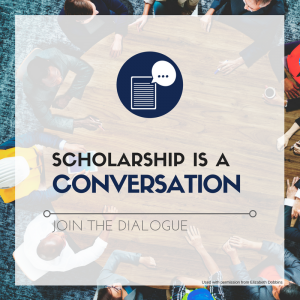
Developing familiarity with the sources of evidence, methods, and modes of discourse in the field assists learners to enter the conversation. New forms of scholarly and research conversations provide more avenues in which a wide variety of individuals may have a voice in the conversation.
A. Knowledge practices:
- Cite the contributing work of others in their own information production;
- Contribute to scholarly conversation at an appropriate level, locally and within the field;
- Identify barriers to entering scholarly conversation via various venues;
- Critically evaluate contributions made by others in participatory information environments;
- Identify the contribution that particular scholarly works make to disciplinary knowledge;
- Summarize the changes in scholarly perspective over time in a topic or discipline;
- Recognize that a given scholarly work may not represent the majority perspective.
B. Student learning outcomes:
- Students evaluate and synthesize competing perspectives
- Students identify the contribution that particular information sources make within an ongoing conversation
- Students consider publishing or archiving research for use by other students and researchers
C. Librarians help with:
- Citation formats for various majors
- Source evaluation and ways of approaching authority
- How to identify notable scholars in a given discipline
- Notion of scholarly consensus and dissension
- Student and faculty scholarly submissions to Milligan DigitalRepository (MDR), Milligan’s Institutional Repository
2. Information Creation is a Process
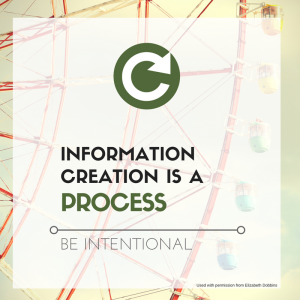
Novice learners begin to recognize the significance of the creation process, leading them to increasingly sophisticated choices when matching information products with their information needs.
A. Knowledge practices:
- Articulate the capabilities and constraints of various creation processes;
- Assess the fit between a creation process and an information need;
- Articulate the processes of information creation and dissemination in a particular discipline;
- Recognize that information may be perceived differently based on its format;
- Recognize the implications of information formats that contain static or dynamic information;
- Monitor the value that is placed upon different types of information products;
- Transfer knowledge of capabilities and constraints to new types of information products;
- Understand that their choices impact the purpose and message of information.
B. Student learning outcomes:
- Students select a source that best meets an information need based on the audience, context, and purpose of various formats
- Students present their research to real or theoretical “audiences” that are not only the professor or their classmates
- Students recognize that similar content may be presented in different formats, which may affect interpretation of the content
- Students create artifacts like films, presentations, and other works beyond the traditional research paper
C. Librarians help with:
- The information cycle in response to events
- The nature of different types of internet sources
- Citation in any research project
- Preservation of projects in non-paper formats
3. Information has Value
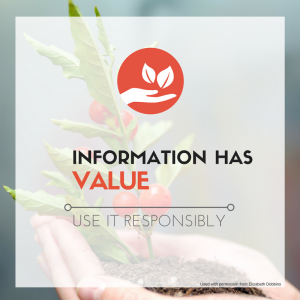
The novice learner may struggle to understand the diverse values of information in an environment where “free” information and related services are plentiful and the concept of intellectual property is first encountered through rules of citation or warnings about plagiarism and copyright law.
A. Knowledge practices:
- Give credit to the original ideas of others through proper attribution and citation;
- Understand that intellectual property is an important legal and social construct;
- Articulate the purpose and distinguishing characteristics of copyright, fair use, open access, and the public domain;
- Understand why some individuals or groups may be underrepresented or marginalized within information systems;
- Recognize issues of access or lack of access to information sources;
- Decide where and how their information is published;
- Understand how the commodification of personal information and online interactions affects them;
- Make informed choices regarding their online actions in full awareness of the above issues.
B. Student learning outcomes:
- Students understand the rationale for citations and use formats effectively
- Students identify perspectives that might be missing from certain information systems
- Students utilize interlibrary loan and other non-library sources to fully explore the discipline
C. Librarians help with:
- Assisting in the proper attribution and citation in a variety of bibliographic styles
- Providing instruction and best practices on copyright compliance
- Supporting open access sharing of academic works through Milligan DigitalRepository (MDR), Milligan’s institutional repository
- Facilitating the use of interlibrary loan
- Evaluating open-source versus subscription resources
- Promoting alternative publishing models to traditional models
4. Research is Inquiry
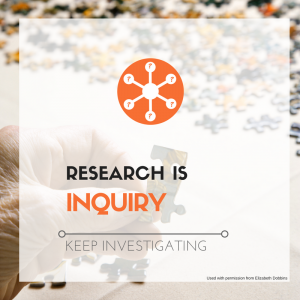
Novice learners acquire strategic perspectives on inquiry and a greater repertoire of investigative methods.
A. Knowledge practices:
- Formulate questions for research based on information gaps or existing information;
- Determine an appropriate scope of investigation;
- Deal with research by breaking complex questions into simple ones;
- Use various research methods, based on need, circumstance, and type of inquiry;
- Monitor gathered information and assess for gaps or weaknesses;
- Organize information in meaningful ways;
- Synthesize ideas gathered from multiple sources;
- Draw reasonable conclusions based on the analysis and interpretation of information.
B. Student learning outcomes:
- Students reframe or refine research questions as needed
- Students work from evidence rather than assumptions, and develop theses in response to data and searching
- Students demonstrate persistence, adaptability, and reflection as components of inquiry
C. Librarians help with:
- Formulating research questions
- Narrowing or broadening a research inquiry to match the assignment
- Finding background research and appropriate database selection
- Searching iteratively and managing results, including instruction in bibliographic managers (e.g., Zotero)
- Determining additional paths of inquiry and other sources of information
5. Authority is Constructed and Contextual
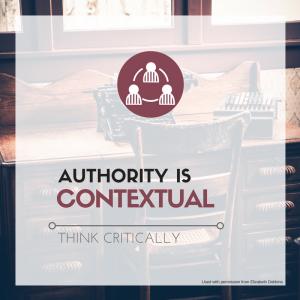
Novice learners may need to rely on basic indicators of authority, such as type of publication or author credentials, where experts recognize schools of thought or discipline-specific paradigms.
A. Knowledge practices:
- Define different types of authority, such as subject, societal, or special;
- Use research tools and indicators of authority to determine the credibility of sources;
- Understand that disciplines have acknowledged authorities: scholars and publications considered “standard”;
- Recognize that authoritative content may include sources of all media types;
- Acknowledge they are developing their own authoritative voices and responsibilities;
- Understand the increasingly social nature of the information ecosystem where authorities connect.
B. Student learning outcomes:
- Students identify markers of authority recognized by disciplines, professions, and other communities of knowledge and practice
- Students identify authoritative information sources based on information need
- Students examine why they choose their sources and whose voice they represent
C. Librarians help with:
- Finding and evaluating information
- Promoting benefits of discipline-specific databases
- Discovering the information cycle and the nature of different information sources
- Avoiding plagiarism
- Using multiple source types for comprehensive evaluation
6. Searching is Strategic Exploration
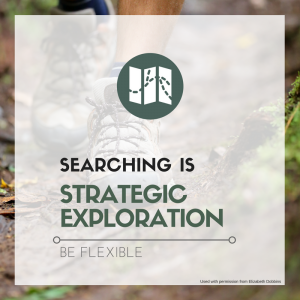
Novice learners may search a limited set of resources, while experts may search more broadly and deeply to determine the most appropriate information within the project scope. Likewise, novice learners tend to use few search strategies, while experts select from various search strategies, depending on the sources, scope, and context of the information need.
A. Knowledge practices:
- Determine the initial scope of the task required to meet their information needs;
- Identify interested parties who might produce information about a topic and then determine how to access that information;
- Utilize divergent (e.g., brainstorming) and convergent (e.g., selecting the best source) thinking when searching;
- Match information needs and search strategies to appropriate search tools;
- Design and refine needs and search strategies as necessary, based on search results;
- Understand how information systems are organized in order to access relevant information;
- Use different types of searching language (e.g., controlled vocabulary, keywords, natural language) appropriately;
- Manage searching processes and results effectively.
B. Student learning outcomes:
- Students design searches strategically, considering and selecting systems to search and evaluate search results
- Students reflect on the search process in order to refine searches and persist in the face of challenges
- Students consult with librarians who may help them find resources they would not have considered
C. Librarians help with:
- Understanding the complexity of the research process
- Developing and refining research topics
- Selecting search terms
- Selecting the best resource for an information need
- Using advanced searching in Milligan OneSearch and subject specific databases
- Navigating discipline specific research tools
- Utilizing archival materials
- Facilitating the use of resources outside of the library resources
Milligan Libraries thanks the libraries at Campbell University, Southern Methodist University, and University of Southern California for their work on developing student learning outcomes appropriate to the Framework. Adapted with permission.
